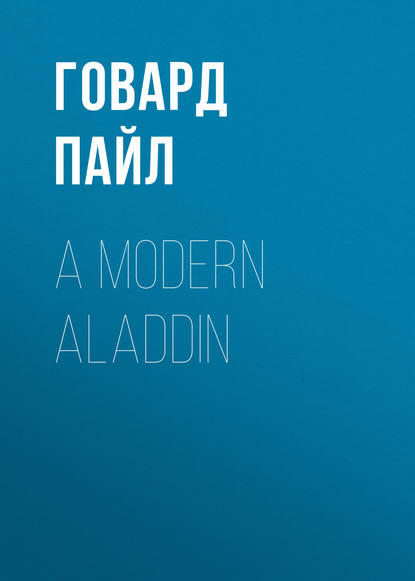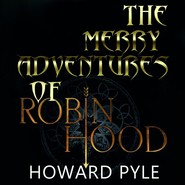По всем вопросам обращайтесь на: info@litportal.ru
(©) 2003-2024.
✖
A Modern Aladdin
Настройки чтения
Размер шрифта
Высота строк
Поля
Such was the matter of Oliver's letter. The Marquis de Flourens sat for a long while meditating very deeply and seriously upon what he had read. That same morning Oliver received a note from him, "Bring your little fortune, my child," it said. "What a father may do for a son, I will do for you."
Scene Sixth. —The marquis's cabinet. The marquis discovered seated at a table, drumming upon it with his fingers, and awaiting the coming of Oliver, who has just been announced. Enter Oliver, carrying a stout iron-bound box, which he deposits upon the table
"Your treasure is in that box?" says the marquis.
Oliver nodded. He was very pale.
The marquis arose, and not only locked the door, but even covered the key-hole from the drilling of inquisitive eyes.
"Now, my dear child," said he, turning to Oliver with a smile, "let us see what we have in our box;" and he drew his chair again to the table beside which Oliver was standing.
They were both of them agitated – the marquis from expectancy, and Oliver from the great cast of the die of his life, which he had determined that day to make. The hand with which he unlocked the box was as cold as ice.
The contents of the box was covered with a layer of cotton. Oliver removed it, and then by two straps lifted out a shallow wooden tray covered with purple velvet, and filled with a glittering mass of diamonds of the purest water, nearly all of them large and fine. The marquis's eyes gleamed as brightly as the stones themselves.
Below the tray was another layer of cotton. Oliver removed it and then another tray; then another layer of cotton and another tray, until there were eight of them spread upon the table – it could hold no more.
"There are two more trays in the box," said Oliver, "but it is not necessary that I should show you them; these are sufficient."
The marquis did not reply; he was overwhelmed by what he beheld; it seemed to him that he saw the treasures of Golconda. Oliver observed his silence, and, looking up, saw that his face had grown white with the intensity of his emotions. At last he drew a deep breath, and raised his eyes to Oliver's; then feeling in his pocket, he drew forth his handkerchief and wiped his face. His voice was husky when he spoke. "But this vast, this unbelievable treasure," said he, "what security shall I give you if you intrust it to me to manage for you?"
The opportunity for Oliver's coup had arrived. The marquis himself had given him the very chance which he sought, but now that he was face to face with it, he trembled, he hesitated, he feared to put his happiness to the test of speech. Yet he knew that now or never was the time to cast the die of his hopes upon the table of fate. He braced himself, gathered all the force of his will, and as the blinding rush of resolution overwhelmed him, he saw only the marquis's face and the marquis's eyes looking into his.
"Your security," said he, hoarsely – and his voice sounded in his ears as though it was not his own – "your security – let it – let it be – your daughter."
The words were spoken. There came a long pause of deep, intense silence, through which Oliver could hear the throbbing blood singing in his ears. The marquis never moved a hair, but sat looking into Oliver's eyes. Oliver felt a dry, hard lump gather in his throat; he tried to swallow it. The marquis pushed back his chair and arose. Oliver's eyes dumbly followed his motion. The marquis began walking up and down the room, but he did not say "No." After a while he stopped before one of the windows and there stood a while, with his hands clasped behind him, looking out upon the lawn and the river beyond. Minute after minute passed in a straining tensity of silence. Oliver began to feel as though he could bear it no longer. Suddenly the marquis spoke:
"My daughter?" said he, half aloud and half to himself. The words meant nothing, but they were not words of refusal. Oliver felt a great wave of blinding hope sweep over him. Suddenly the marquis turned and came back to the table. He motioned Oliver to a chair. "Let us talk this matter over," said he, seriously, and they both sat down. Oliver's heart thumped within him like a trip-hammer. "Do you know," said the marquis, "what a thing it is that you ask? Do you know that you ask an alliance with one of the noblest houses of France?" Oliver could not answer. "And you," continued the marquis, "who are you? I do not know you; nobody knows you. You may be what you represent yourself to be; you may be an adventurer."
Oliver's heart was sinking like a plummet of lead. "My diamonds are real," he croaked.
The marquis smiled, and then a long space of silence fell. At last he spoke again, and his words shot through Oliver's heart like a dart. "What settlement, then, would you propose to make upon your wife?" said he.
"Wife!" Oliver's heart thrilled with the sudden keenness of that pang of sharp delight. His brain whirled in an eddy of dizzy light. At last, with a supreme effort, he found his tongue. "Anything," he cried – "anything that you choose!"
The marquis smiled again. "We are ardent," said he. "I see that if this matter is to be carried forward, I must act not only as a father, but as a friend. I confess to you, Oliver, that I am deeply in debt, that Flourens is mortgaged to the last inch. Would you be willing to release Flourens, and then settle the estate upon your wife?"
"Yes," said Oliver, eagerly.
The marquis's smile grew wider than ever. "That is good," said he. "But you must know that you are one of the richest men in France, Oliver. You should do even more than that for your wife."
"I will settle upon her everything that I have in the world," said Oliver.
The marquis laughed. "Ah!" said he, "we are certainly too ardent – far too ardent. Half of your fortune would be sufficient; or three-quarters of it, at the most."
"She shall have either, as you may choose," said Oliver.
"I suppose," said the marquis, "that it will be best that I should manage her fortune for her?"
"Yes," said Oliver. "And you shall manage mine also, if you choose."
The marquis saw that there was no limit to Oliver's complacency. "And you will subscribe to that?" said he.
"Yes," said Oliver. "I am willing to subscribe to anything."
The marquis rose from the chair, and opened his arms. "Embrace me, my son," said he.
Oliver could have cried with happiness. "And may I," said he, tremulously, when the marquis had released him from his arms – "may I then – " He hesitated; he could not believe that he had reached such a dizzy pinnacle of happiness.
The marquis laughed. "You will find mademoiselle in the garden," said he.
Scene Seventh. —The Watteau-like garden described before – the trees, the statues, the fountains, the flowers, the river. Mademoiselle Céleste is discovered sitting in the shade, reading, and making just such a picture as the great artist would have painted upon a fan
Enter Oliver, running down the steps of a terrace, dizzy with joy, like one in the bewildering glamour of a golden dream. He seemed to tread upon air! The blue sky, green foliage, the flowers, the statues, the rivers, swam together in a confusion of bewildered delight. At the sound of his footsteps she raises her eyes, and lays aside her book, and greets him with the smile of an acquaintance.
"Oh!" said she; "it is you, then? I have been waiting for you."
Oliver's heart was fluttering within him. At first he could not speak, and she must have read his joy and his secret in his face, for the rosy hue upon her cheeks deepened.
He sank upon his knees beside her. "I love you," he whispered, tremulously.
Her face was turned away from him, but she did not withdraw the hand which he held. There was a long time of silence. Oliver raised her hand to his lips.
"But my father," she murmured at last.
"He bade me seek you here," cried Oliver, eagerly. Then again: "Oh, Céleste, I love you! I love you!"
She turned her face towards him; her eyes met his then. Could he believe it? Was it real? His lips met others, soft, warm, fragrant. The flowers, the parterres, the trees, the blue sky, the white marble statues – all dissolved into a golden ether. Flourens? It was heaven!
Madame the Marquise made no objection to it all. She had become accustomed to Oliver and his diamonds. He was a pleasant, cheerful, handsome fellow. It made her heart feel lighter to have him about. As was said, she had forgiven the ill taste of the display of diamonds, and now expressed her approval of the arrangement. Oliver's heaven was without a cloud.
Scene Eighth. —The marquis's private closet
A month had passed – a month of delight, of joy, of love; and then one morning the Marquis de Flourens let fall a torpedo in the midst of Oliver's little paradise. That morning, when Oliver went to the château, the marquis sent for him. Oliver found him seated at the table, playing idly with a gold pencil-case. He did not ask Oliver to be seated, but went directly to the point.
"A week from next Monday," said he, "we shall go to Paris. You also, my dear Oliver."
Oliver stood like one stunned. He made no answer, but his mind, in a single sweep, cleared the whole horizon. To Paris! He remembered the master's commands – those commands so terribly absolute; he remembered his threats of punishment if he (Oliver) should disobey that mandate. What was that threat? Oliver remembered it well. It was that that terrible mysterious being, who had so nearly doomed him to a dreadful, unspeakable death, would crush him, would annihilate him, would make him wish a thousand times, in his torments, that he had never been born. Those were almost the very words, and Oliver had not forgotten them. He had learned much of his master in the year that he had lived with him, and he knew that that threat was not idle. He knew that the master would do as he said to the last jot and tittle. That cool, smiling, sinister devil! He could destroy all of this happiness as easily as one can destroy a beautiful soap-bubble that a child has created from nothing.
"I do not wish to go to Paris," said Oliver, huskily.
The marquis's face darkened. "Not wish to go to Paris?" he repeated. "But you must go, Oliver."
"No," said Oliver; "I do not wish to go. I shall not go. I would rather stay here at Flourens. I do not like Paris."
The marquis came over and took Oliver by the button of his coat. His face was not pleasant to see. "You do not like Paris!" said he. "Very well; then you shall stay here, my dear Oliver – you and your fortune. But in that case, my child, you need never come here to the château again. You comprehend me?"
Oliver looked out of the window. Céleste was waiting for him upon the terrace. Never had she looked so exquisitely beautiful. He groaned.












